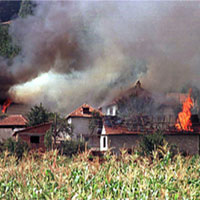Regarding statements by Ministers in the Serbian government Ivica Dačić and Aleksandar Vulin: Instead of “exonerating” Milošević, better to Establish the Facts about the Past
 Responding to the claims of certain analysts and bloggers, according to whom the former president of Serbia and the Federal Republic of Yugoslavia (FRY) Slobodan Milošević was „exonerated“ of the charges for crimes committed in Bosnia and Herzegovina by the ICTY judgment rendered in the case of Radovan Karadžić, Serbian government ministers Ivica Dačić and Aleksandar Vulin have rushed to accept such a view and to conclude that „the ICTY has confirmed the legitimacy of Milošević’s policy“. The Humanitarian Law Center (HLC) strongly condemns statements the purpose of which is to deny the facts about the wars in the former Yugoslavia and to restore Milošević’s policy. The HLC demands that the state authorities of Serbia start a broad social debate on the past and initiate setting up the Regional Commission for the establishment of the facts about war crimes and other serious violations of human rights committed in the former Yugoslavia from January 1, 1991 until December 31, 2001 (RECOM).
Responding to the claims of certain analysts and bloggers, according to whom the former president of Serbia and the Federal Republic of Yugoslavia (FRY) Slobodan Milošević was „exonerated“ of the charges for crimes committed in Bosnia and Herzegovina by the ICTY judgment rendered in the case of Radovan Karadžić, Serbian government ministers Ivica Dačić and Aleksandar Vulin have rushed to accept such a view and to conclude that „the ICTY has confirmed the legitimacy of Milošević’s policy“. The Humanitarian Law Center (HLC) strongly condemns statements the purpose of which is to deny the facts about the wars in the former Yugoslavia and to restore Milošević’s policy. The HLC demands that the state authorities of Serbia start a broad social debate on the past and initiate setting up the Regional Commission for the establishment of the facts about war crimes and other serious violations of human rights committed in the former Yugoslavia from January 1, 1991 until December 31, 2001 (RECOM).
The HLC takes this opportunity to remind the public that during the Radovan Karadžić trial, the evidence presented related to the criminal responsibility of the indicted wartime president of the Republic of Srpska, and no one but him could be convicted or acquitted by the judgment. Therefore, there can be no judgment of acquittal for Milošević or anyone other than the person who was charged in the actual case; and in this case, the indictee (Karadžić) was sentenced by the first instance judgment to 40 years in prison for genocide and other crimes committed in Bosnia and Herzegovina.
The role of Slobodan Milošević and the Serbian leadership in the wars of the 1990s can be seen in numerous ICTY judgments, including the Radovan Karadžić judgment, but it cannot be inferred by selective reading of individual sentences and paragraphs, only by an overall assessment of the evidence and judicial facts. Thus, any conclusions about Milošević’s innocence and the alleged validity of his policy are contradicted by citations from other ICTY judgments (such as in the cases Milan Martić and Vlastimir Đorđević) in which he is described as a participant in various joint criminal enterprises in the wars in the former Yugoslavia, as well as by judicially established facts in the Karadžić case about the role of the state of Serbia (led by Milošević at that time) in helping the wartime leadership of the Republic of Srpska throughout the entire war in Bosnia and Herzegovina. One can see in the judgment, for instance, that Karadžić maintained regular contact with Milošević during the war in Bosnia and Herzegovina, and that Serbia sent help to the Bosnian Serb army in the form of money and fuel, as well as special police units such as the Crvene beretke (Red Berets) and „Arkanovci” (units under the command of Željko Ražnatović Arkan). (See, for example, paragraph 3287 of the Karadžić judgment).
In addition, a lot of evidence was presented during the trial of Slobodan Milošević on charges of crimes committed in Croatia, Bosnia and Herzegovina and Kosovo, which pointed to his role in the crimes for which he was allegedly exonerated by the Karadžić judgment. After the prosecution had presented its case, the Trial Chamber dismissed the motion of the amicus curiae for Milošević to be acquitted at that stage of the proceedings. In the Decision on the Motion for Judgment of Acquittal of June 16th, 2004, it is stated that „there is sufficient evidence that the accused (Milošević) was a participant in a joint criminal enterprise“ which included the perpetration of genocide and other crimes against Bosniaks in Bosnia and Herzegovina.
During the trial of Slobodan Milošević, ample evidence that „the war was financed from Belgrade“ was presented, as also that the Serb armies from Bosnia and Krajina were constantly paid from Belgrade while they were committing crimes against non-Serbs in Croatia and Bosnia and Herzegovina, and that they had logistic support from the Ministry of Defense, Ministry of the Interior and other authorities of Serbia and FRY. There is one piece of evidence in particular, which was presented during the trial of Milošević, and that was a statement made by Radovan Karadžić in May 1994, in which he stated that “there could be no war without Serbia, we do not have the resources and we would not be able to wage the war“. (See, for example, the analysis by Human Rights Watch Weighing the evidence – Lessons from the Milošević trial.)
It is important to point out that in the judgment of the International Court of Justice, it was concluded that Serbia violated the Convention on the Prevention and Punishment of the Crime of Genocide on two grounds – firstly, because it did nothing to prevent the July 1995 Srebrenica massacre, „although it must have been clear to Serbia that there was a serious risk of genocide“; and secondly, because it did not punish those participants in the crime who were accessible to the authorities of the Republic of Serbia. This is the most severe judgment in the seventy-years-old history of the work of the International Court of Justice, and the only one referring to a violation of the Convention on the Prevention and Punishment of Genocide. The judgment was handed down because of actions [not] undertaken by the Serbian state, at a time when it was led by Slobodan Milošević, whose policies are being glorified at present.
The statements by ministers Dačić and Vulin, represent on the one hand an attempt to whitewash the wartime past of Slobodan Milošević, and also to reduce their own responsibility for the sufferings during the wars in the former Yugoslavia, in view of the fact that they were his political and/or party associates. On the other hand – and this is far more dangerous – the aim is to justify and decriminalize Milošević’s politics, and re-legitimize the idea of a Greater Serbia. Particularly disturbing is the fact that the Minister of Foreign Affairs, as one of the key government officials in negotiations on the accession of Serbia to the European Union, calls out „Western politicians“ because of their unwillingness to comply with the conclusion about the innocence of Milošević and his leadership for waging the war and committing crimes during the wars of the 1990s .
The HLC urges the two aforementioned ministers and the entire state leadership of Serbia to refrain from such inept and inappropriate statements in future, and instead of denying and justifying the crimes, to contribute to the opening of a comprehensive and fact-based public debate about the events of the past. Considering that Serbia participated in most of the conflicts in the region from 1991 to 2001, the HLC urges its current leadership to initiate the establishment of a Regional Commission for establishing the facts about war crimes (RECOM), instead of glorifying those participants in the wartime events who were most responsible for the massive human rights violations; because the best way for a sincere understanding and overcoming of the traumatic past lies in a joint fact-finding, in which the representatives of all post-Yugoslav states would participate.
Reliable conclusions about the responsibility for the war and the very serious crimes committed against civilians and prisoners of war during the wars in the territory of the former Yugoslavia, cannot be reached on the basis of a mere few paragraphs of one judgment, but by considering all the court-established facts, information on the human losses, and statements of victims and other participants in war events, as well as by obtaining an insight into the military and police documents from the wartime period, a large part of which are still hidden from the public eye.







